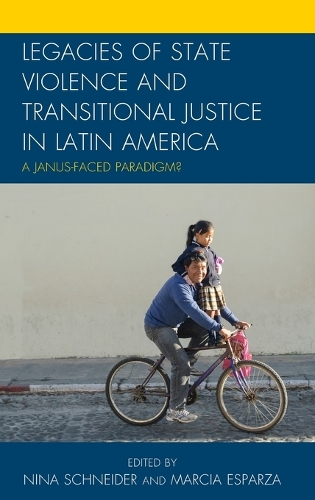
Legacies of State Violence and Transitional Justice in Latin America: A Janus-Faced Paradigm
(Hardback)
Publishing Details
Legacies of State Violence and Transitional Justice in Latin America: A Janus-Faced Paradigm
By (Author) Global South Study Center
Edited by Marcia Esparza
Contributions by Steve Dobransky
Contributions by Rosario Figari Layus
Contributions by Roberto Gargarella
Contributions by Ceclia MacDowell Santos
Contributions by Jesus Pea
Contributions by Renan Quinalha
Contributions by Percy Rojas
Contributions by Debbie Sharnak
Bloomsbury Publishing PLC
Lexington Books
22nd October 2015
United States
Classifications
Professional and Scholarly
Non Fiction
Political structure and processes
Violence and abuse in society
History of the Americas
340.115098
Physical Properties
Hardback
214
Width 158mm, Height 238mm, Spine 21mm
458g
Description
Legacies of State Violence and Transitional Justice in Latin America presents a nuanced and evidence-based discussion of both the acceptance and co-optation of the transitional justice framework and its potential abuses in the context of the struggle to keep the memory of the past alive and hold perpetrators accountable within Latin America and beyond. The contributors argue that transitional justiceunderstood as both a conceptual framework shaping discourses and a set of political practicesis a Janus-faced paradigm. Historically it has not always advanced but often hindered attempts to achieve historical memory and seek truth and justice. This raises the vital question: what other theoretical frameworks can best capture legacies of human rights crimes Providing a historical view of current developments in Latin Americas reckoning processes, Legacies of State Violence and Transitional Justice in Latin America reflects on the meaning of the paradigms reception: what are the broader political and social consequences of supporting, appropriating, or rejecting the transitional justice paradigm
Reviews
This volume engages critically with the paradigm of transitional justice (TJ) and its application in Latin America.... [T]his book represents a valuable contribution to an emerging literature that abandons triumphalist discourses concerning TJ and calls for a critical examination of the ideological foundations, results and shortcomings of this paradigm * Journal of Latin American Studies *
This is an excellent collection that should be read by all students and practitioners of transitional justice. The case studies cut through much of the verbiage that has dominated debate by showing what happens and has happened to real people on the ground. * Hispanic American Historical Review *
Legacies of State Violence and Transitional Justice in Latin America examines the cross-cutting temporalities and multiple frictions at play when various stakeholders debate how best to satisfy the claims to truth, memory, and justice amidst the legacies of violent and authoritarian regimes. This book raises important challenges to the existing transitional justice paradigm, amply demonstrating that social and economic rights are key components of victim-survivors repertoire of justice. -- Kimberly Theidon, Tufts University
Author Bio
Nina Schneider is a visiting scholar at the National University of Braslia, a research fellow at the Global South Study Center (GSSC) at the University of Cologne, and an associate fellow of the Zukunftskolleg at the University of Konstanz. Marcia Esparza is associate professor in the Department of Criminal Justice at John Jay College of Criminal Justice, founder and co-director of the Historical Memory Project (HMP), andvisiting scholar of the Zukunftskolleg at the University of Konstanz.
